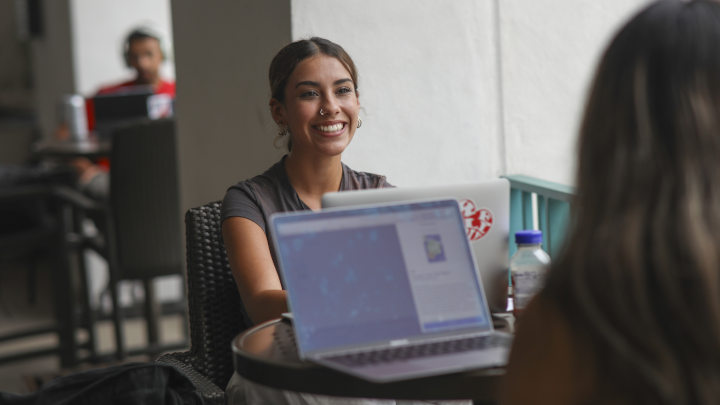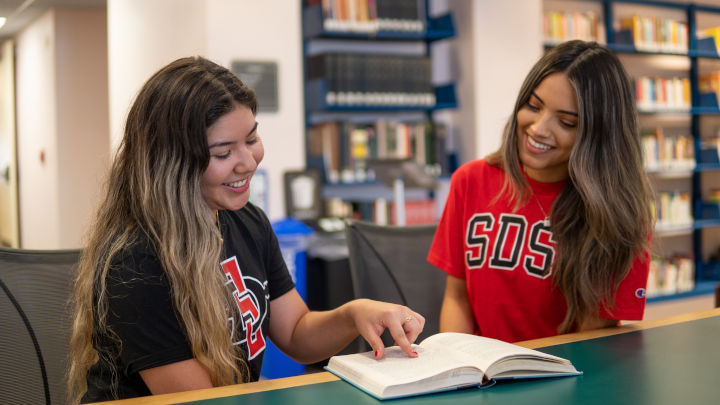Students at Our Core
SDSU commits to a future where all students are able to achieve their greatest potential. Our collective efforts will elevate SDSU as a national exemplar, providing education and training for the innovators and leaders our region and global society demand. SDSU will provide access to success through transformational experiences in and outside of the classroom for undergraduate, graduate, and lifelong learners. With an enduring commitment to innovation, resilience and to our students, we will cultivate a university culture and infrastructure that facilitates an affordable, student-centered, wellness-focused, life-long educational journey, supported by every member of the SDSU community.
Metrics of progress:
- Graduation and retention rates
- Equity gaps
- Access for local/in-state students
- Improvements in student support infrastructure
- Achievements related to student success

Accomplished: Students receive 99.9% of scholarships – an SDSU record
SDSU has distributed nearly every dollar of scholarship funds available to students as part of a major effort to phase out its legacy system and onboarded a centralized enterprise system, SDSU Aztec Scholarships. The application process was also simplified for students to aid them in securing scholarships more easily and more quickly, with more students graduating debt-free.
All Activities
| Description | Status |
|---|---|
ACTIVITY #45By December 2021: Provide all faculty and advisors with information on student success and equity gaps in their classrooms and their respective colleges. In addition, provide research-informed recommendations and professional development for ways to support student success in their teaching. |
COMPLETEAllocated funding and successfully hired the Director for Student Success Analytics; Developed and delivered data resources accessible to faculty, staff and administrators to identify and track student success metrics including the Data Resources Map; Analyzed disaggregated data for each college and delivered customized College Insights Reports identifying progress toward GI 2025 targets and areas of opportunity for action as well as plans. |
ACTIVITY #46
By December 2021: Invest in campuswide technological and professional development support as the foundation for a coordinated campus approach to advising, teaching, and co-curricular support services. |
COMPLETEImplemented Campuswide Coordinated Plan, including total overhaul of advising model and institutionalization of Gen S 100 courses for all first years; Campuswide implementation of EAB Navigate, scaling up from a few dozen users in EOP and Athletics to 500+ active users. |
ACTIVITY #47
By December 2021: Ensure that all academic programs are actively and continuously engaged in equity-driven, evidence-based improvement efforts that reflect best practices of assessment. |
COMPLETEEstablished Office of Curriculum, Assessment and Accreditation, adopted Nuventive platform, hired Assessment and Accreditation Analyst and (faculty) Director of Continuous Improvement |
ACTIVITY #48
By December 2023: Achieve a 75% placement rate for undergraduate students in internships, research opportunities, and fellowships to enhance employability and access to graduate studies. |
COMPLETEIn May/June 2023: 83% of survey respondents who graduated with an undergraduate degree, indicated that they had participated in one or more work or experiential learning opportunities that enhanced their employability or access to graduate studies (N = 1,517 students graduating with an undergraduate degree) |
ACTIVITY #49By December 2023: Ensure that all graduate programs will develop a professional development plan for graduate students. |
IN PROGRESS |
Additional Accomplishments
- Established the Center for Inclusive Excellence
- Every division, college and academic department has a unit-level diversity plan, reviewed and approved by the Senate Diversity, Equity and Inclusion committee.
- Increased full-time staff for the Office of Faculty and Staff Diversity, including two Learning and Development Specialists, Administrative Coordinator and Equity Analyst.
- Established the Office of HSI Affairs and HSI Advisory Councils
All Activities
| Description | Status |
|---|---|
ACTIVITY #50By Fall 2023: Develop a university infrastructure that fosters and sustains regional partnerships with K-12 schools, community colleges, educational organizations, an industry that promotes college readiness and a college-going culture. |
IN PROGRESS |
ACTIVITY #51
By June 2025: Increase the number of SDSU Global Campus adult learners by 25%. |
IN PROGRESS |
Additional Accomplishments
- Campuswide implementation of EAB /SDSU Navigate, persisting through my.SDSU-related interruptions, including campus-wide adoption of college-specific success markers
- Re-enrollment Initiative
- Departments required to integrate anti-racism and social justice into curriculum
- Hosted the first ever Retention Forum with representatives across divisions to discuss retention strategies especially for underrepresented student groups.
- YMOC Retention Study Group
Goal 3: To support student success and well-being both inside and outside the classroom, SDSU will strategically increase its programming, resources and capacity to provide mental health, wellness and basic needs support for all undergraduate and graduate students.

Accomplished: New student resources, centers to drive success
SDSU has bolstered student resources and centers dedicated to their retention, graduation and overall success, to include mentorship programs, career-readiness placements and research efforts. Toward the end of the strategic plan’s first phase, SDSU saw a more than 40% increase in student participation in the SDSU Student Symposium since 2017.
All Activities
| Description | Status |
|---|---|
ACTIVITY #52By June 2021: Implement a wellness toolkit for faculty and staff to further promote and educate the campus community about the resources available for students through Counseling & Psychological Services and the Economic Crisis Response Team (ECRT) to support student mental health and basic needs. |
COMPLETEToolkit launched. |
ACTIVITY #53
By June 2021: Develop a service delivery model that expands placement of therapists in university programs, departments and centers in order to increase capacity to meet the unique needs of all students, including students from diverse backgrounds, graduate students and students enrolled in SDSU Global Campus programs. |
COMPLETE |
ACTIVITY #54
By December 2024: Open a new multidisciplinary space to house and support campus basic needs initiatives. The space will serve as a wellness hub for presentations and workshops and where students can meet with ECRT case managers and community partners to receive one-on-one personalized support. |
COMPLETEBasic Needs Center opened. |
Additional Accomplishments
- Established the Center for Inclusive Excellence
- Every division, college and academic department has a unit-level diversity plan, reviewed and approved by the Senate Diversity, Equity and Inclusion committee.
- Increased full-time staff for the Office of Faculty and Staff Diversity, including two Learning and Development Specialists, Administrative Coordinator and Equity Analyst.
- Established the Office of HSI Affairs and HSI Advisory Councils

